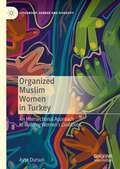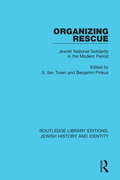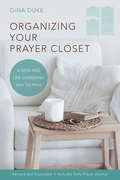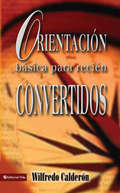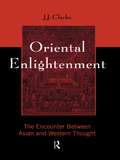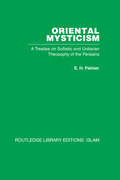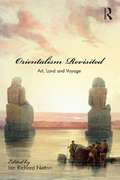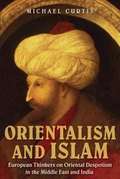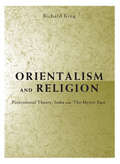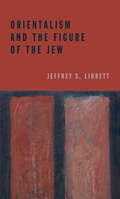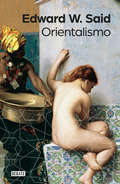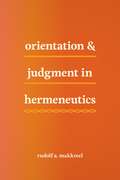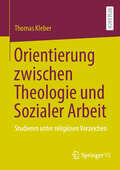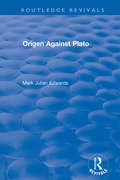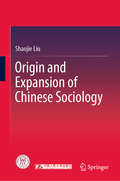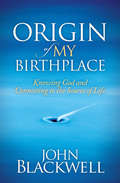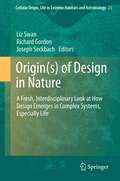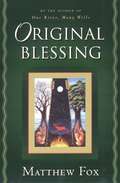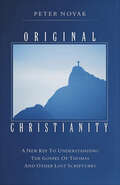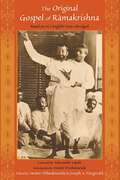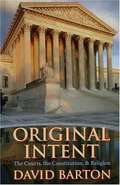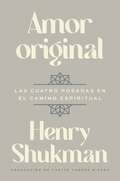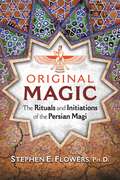- Table View
- List View
Organized Muslim Women in Turkey: An Intersectional Approach to Building Women’s Coalitions (Citizenship, Gender and Diversity)
by Ayşe DursunThis book explores the politics of organized Muslim women in Turkey and analyzes their coalitions with other—secular feminist, Kurdish, etc.—women’s movements from an intersectional perspective. It provides empirical evidence for significant changes in Muslim women’s politics under the ruling Justice and Development Party (AKP) and points to the increasing difficulty to build cross-movement women’s coalitions in the face of rising religious-conservatism and authoritarianism under the AKP rule. While feminist Muslim women who display an intersectional understanding of structural inequality and oppression are found to be more resilient in the face of political pressure, conservative Muslim women dodge women’s coalitions and align with the government’s discourses and policies. Empirical evidence based on interviews with organized Muslim women also shows that prospects for coalition building largely depends on the specific societal and institutional (re-)configurations of patriarchy along with other relations of domination rather than mere ideological “difference” among women. This book will be of interest to scholars and students across Gender Studies, Sociology, and Political Science, particularly those whose research focuses on intersectionality and social movements.
Organizing Rescue: Jewish National Solidarity in the Modern Period (Routledge Library Editions: Jewish History and Identity)
by S. Ilan Troen Benjamin PinkusUpheavals of the modern period have dramatically changed the traditional pattern of the rescue of Jews by Jews. Whereas until the mid-nineteenth century rescue was carried out by community leaders in accordance with the religiously rooted injunction for the redemption of captives, in the modern period largely secular international Jewish organizations and the State of Israel have emerged as the primary instruments of expressing Jewish national solidarity. The campaigns to restore the exodus from the Soviet Union and to rescue Ethiopian Jews through Operation Moses are the most recent expressions of the imperative to save threatened Jewish communities and reconstitute them elsewhere. The dynamics and achievements of organized rescue in the modern period are critically assessed in this volume, which includes 18 interpretive essays and case studies by leading European, American and Israeli scholars. Organizing Rescue is divided into four sections. The introductory essays examine the roots of Jewish solidarity in Jewish law, and trace the transformation of rescue activity from a religious to a largely secular undertaking. The three sections that follow group selected case studies chronologically. Part I, from the Damascus Affair to the First World War (1840-1914), deals with new patterns of response to the persecution of Jews in Europe, Asia and Africa under the impact of emancipation, nationalism and antisemitism. Part II, World Wars and the Shadow of the Holocaust (1914-1948), deals with the transitional period that brought hope and bitter disillusion to Jews in Europe and the Middle East. Part III, The Contemporary Period (1948 to the present), examines the different manifestations of Jewish national solidarity that developed in response to the Holocaust and the creation of the State of Israel. These studies illuminate and evaluate the efforts of Jews to defend and preserve communities separated by vast distances and diverse cultural and political systems. By placing these studies in an integrated historical and comparative framework, Organizing Rescue provides a timely and unique perspective for understanding national Jewish solidarity in the modern period.
Organizing Your Prayer Closet: A New and Life-Changing Way to Pray
by Gina DukeHave you ever spoken the words "I will pray for you" only to shortly forget that you have been entrusted with a crucial request from a friend or loved one? Have you ever wondered if prayer even works?Statistics from a Christianity Today survey found that 48 percent of the Christians surveyed were unhappy with their prayer life, 34 percent revealed that they did not know how to pray, while 31 percent were not sure that God ever responded to their prayers. For anyone who has ever questioned the practice of prayer or become frustrated with a lack of spiritual fervor, Organizing Your Prayer Closet offers a holistic, new approach to revitalizing this important spiritual discipline.Organizing Your Prayer Closet both inspires and equips with Scripture, inspirational quotes, and space for journaling. In the first section, author Gina Duke illuminates the importance and power of prayer as the best connection to the source of all strength. Then, she breaks down tough spiritual concepts into practical exercises with 52 weekly worksheets that guide and equip you on a yearlong prayer journey. Each week you will be challenged to complete lessons on interacting with scripture, overcoming prayer hurdles, learning to pray authentically, holding yourself accountable, and more.
Orientación básica para recién convertidos
by Sr. Wilfredo CalderónEsta edición revisada y ampliada de Orientación para Recién Convertidos es de gran utilidad para muchísimos pastores, especialmente para los que utilizaron la edición anterior. En sus nueve capítulos, usted encontrará instrumentos de repaso y consolidación. Si bien esta obra se presta para que la lea el creyente nuevo, es mucho más eficaz si se usa como manual de estudio para las primeras semanas de preparación de nuevos miembros. A pesar de que el enfoque central del libro es el recién convertido, todo creyente puede beneficiarse de su lectura. Inclusive los que son miembros activos todavía necesitan afianzar las primeras etapas del conocimiento práctico de la Biblia y la vida cristiana. Todo esto y mucho más puede lograrse con un manual tan sencillo, pero a la vez abundante en recursos espirituales, como este.
Oriental Enlightenment: The Encounter Between Asian and Western Thought
by J.J. ClarkeWhat is the place of Eastern thought - Buddhism, Taoism, Hinduism, Confucianism - in the Western intellectual tradition? Oriental Enlightenment shows how, despite current talk of 'globalization', there is still a reluctance to accept that the West could have borrowed anything of significance from the East, and explores a critique of the 'orientalist' view that we must regard any study of the East through the lens of Western colonialism and domination.Oriental Enlightenment provides a lucid introduction to the fascination Eastern thought has exerted on Western minds since the Renaissance.
Oriental Mysticism: A Treatise On Sufistic And Unitarian Theosophy Of The Persians
by E H PalmerOriginally published 1867. This volume describes not only the basic tenets of the Sufis but also the Ahl i wahdat which was a branch of Sufism. The author’s use of a Persian manuscript treatise by ‘Aziz bin Mohammed Nafasi’ is an indispensable tool, particularly because the author did not merely translate it but gave a clearer and more succinct account of the system. The volume contains an Appendix containing a glossary of allegorical and technical terms in use among Sufiistic writers.
Orientalism Revisited: Art, Land and Voyage (Culture and Civilization in the Middle East)
by Ian Richard NettonThe publication of Edward Said’s Orientalism in 1978 marks the inception of orientalism as a discourse. Since then, Orientalism has remained highly polemical and has become a widely employed epistemological tool. Three decades on, this volume sets out to survey, analyse and revisit the state of the Orientalist debate, both past and present. The leitmotiv of this book is its emphasis on an intimate connection between art, land and voyage. Orientalist art of all kinds frequently derives from a consideration of the land which is encountered on a voyage or pilgrimage, a relationship which, until now, has received little attention. Through adopting a thematic and prosopographical approach, and attempting to locate the fundamentals of the debate in the historical and cultural contexts in which they arose, this book brings together a diversity of opinions, analyses and arguments.
Orientalism and Islam: European Thinkers on Oriental Despotism in the Middle East and India
by Michael CurtisThrough an historical analysis of the theme of Oriental despotism, Michael Curtis reveals the complex positive and negative interaction between Europe and the Orient. The book also criticizes the misconception that the Orient was the constant victim of Western imperialism and the view that Westerners cannot comment objectively on Eastern and Muslim societies. The book views the European concept of Oriental despotism as based not on arbitrary prejudicial observation, but rather on perceptions of real processes and behavior in Eastern systems of government. Curtis considers how the concept developed and was expressed in the context of Western political thought and intellectual history, and of the changing realities in the Middle East and India. The book includes discussion of the observations of Western travelers in Muslim countries and analysis of the reflections of six major thinkers: Montesquieu, Edmund Burke, Tocqueville, James and John Stuart Mill, Karl Marx, and Max Weber.
Orientalism and Religion: Post-Colonial Theory, India and "The Mystic East"
by Richard KingOrientalism and Religion offers us a timely discussion of the implications of contemporary post-colonial theory for the study of religion. Richard King examines the way in which notions such as mysticism, religion, Hinduism and Buddhism are taken for granted. He shows us how religion needs to be reinterpreted along the lines of cultural studies. Drawing on a variety of post-structuralist and post-colonial thinkers, such as Foucault, Gadamer, Said, and Spivak, King provides us with a challenging series of reflections on the nature of Religious Studies and Indology.
Orientalism and the Figure of the Jew
by Jeffrey S. LibrettOrientalism and the Figure of the Jew proposes a new way of understanding modern Orientalism. Tracing a path of modern Orientalist thought in German across crucial writings from the late eighteenth to the mid–twentieth centuries, Librett argues that Orientalism and anti-Judaism are inextricably entangled.Librett suggests, further, that the Western assertion of “material” power, in terms of which Orientalism is often read, is overdetermined by a “spiritual” weakness: an anxiety about the absence of absolute foundations and values that coincides with Western modernity itself. The modern West, he shows, posits an Oriental origin as a fetish to fill the absent place of lacking foundations. This fetish is appropriated as Western through a quasi-secularized application of Christian typology. Further, the Western appropriation of the “good” Orient always leaves behind the remainder of the “bad,” inassimilable Orient.The book traces variations on this theme through historicist and idealist texts of the nineteenth century and then shows how high modernists like Buber, Kafka, Mann, and Freud place this historicist narrative in question. The book concludes with the outlines of a cultural historiography that would distance itself from the metaphysics of historicism, confronting instead its underlying anxieties.
Orientalismo (Ensayo/debolsillo Ser. #Vol. 53)
by Edward W. SaidUn clásico imprescindible para comprender los eternos malentendidos sobre el mundo islámico. En estos tiempos en que los medios de comunicación nos inundan y se ven inundados por imágenes y estereotipos que se refieren al Islam y a los musulmanes, Edward W. Said nos ofrece una descripción rigurosa y esclarecedora de la formación y desarrollo de estas «ideas recibidas» o tópicos que muchas veces impiden o sesgan nuestra visión. En Orientalismo, Edward W. Said nos ofrece una descripción esclarecedora de la formación y desarrollo de los tópicos sobre el islam y los musulmanes, que muchas veces impiden o sesgan nuestra visión. Se nos muestra cómo estos «clichés ideológicos» obedecen a los intereses y estrategias del poder dominante y señala la dificultad para el mundo occidental de pensar sobre Oriente si antes no se logra romper esos prejuicios que distorsionan nuestra lectura. Asimismo nos muestra cómo la relación entre Oriente y Occidente es una relación de poder, construida sobre la subordinación de la idea de Oriente al fuerte imaginario occidental asentado en la superioridad centralista de un «nosotros» enfrentado a un «ellos», lo no europeo, vivido como «lo extraño». Reseña:«Una crítica lúcida como la de Said resulta más necesaria que nunca.»Juan Goytisolo, El País
Orientation & Judgment in Hermeneutics
by Rudolf A. MakkreelThis book provides an innovative approach to meeting the challenges faced by philosophical hermeneutics in interpreting an ever-changing and multicultural world. Rudolf A. Makkreel proposes an orientational and reflective conception of interpretation in which judgment plays a central role. Moving beyond the dialogical approaches found in much of contemporary hermeneutics, he focuses instead on the diagnostic use of reflective judgment, not only to discern the differentiating features of the phenomena to be understood, but also to orient us to the various meaning contexts that can frame their interpretation. Makkreel develops overlooked resources of Kant’s transcendental thought in order to reconceive hermeneutics as a critical inquiry into the appropriate contextual conditions of understanding and interpretation. He shows that a crucial task of hermeneutical critique is to establish priorities among the contexts that may be brought to bear on the interpretation of history and culture. The final chapter turns to the contemporary art scene and explores how orientational contexts can be reconfigured to respond to the ways in which media of communication are being transformed by digital technology. Altogether, Makkreel offers a promising way of thinking about the shifting contexts that we bring to bear on interpretations of all kinds, whether of texts, art works, or the world.
Orientierung zwischen Theologie und Sozialer Arbeit: Studieren unter religiösen Vorzeichen
by Thomas KleberDas Buch bearbeitet in einem neuen Format (Orientierungslagen) an 50 Studierenden die Fachsozialisation eines integralen Studiengangs zwischen Theologie und Sozialer Arbeit. Die Sichtweise auf die Vereinbarkeit der disziplinären Binnenlogiken ist dabei höchst subjektiv und wird, unter den Annahmen und Erwartungen der Bedeutung des Religiösen für soziales Arbeiten den Studierenden zur Herausforderung. Die individuellen Veränderungen in Elementarorientierungen während des Studiums verweisen auf aktuelle Gründe (Relationalität) und hinterfragen die gängige Aufbereitung von beruflichen Habitus-Konzepten in ihrer Fassung als Typus.
Origen Against Plato (Routledge Revivals)
by Mark Julian EdwardsThis title was first published in 2002.Origen (AD 185 - 254) is regarded as one of the figures chiefly responsible for the contamination of biblical theology with pagan philosophy in the early church. Edwards argues that Origen set out to construct a Christian philosophy, yet he did so with the intention of preserving theology from the infiltration of pagan thought. Examining the question of philosophical influence on Christian thought, Edwards argues that scholars have often leapt to unjustified conclusions based simply on common vocabulary or parallel development. This book advances new interpretations of the early Christian systems which are generally called 'Gnostic', and the Doctrine of the Trinity in Origen's 'Platonist' teacher Clement of Alexandria. Edwards concludes that Origen's hermeneutics, eschatology, cosmology and Trinitarian theology are all related to his understanding of human nature, which is radically opposed to that of Platonism.
Origen: Contra Celsum
by Henry ChadwickFew works of the early Church are as interesting to the modern reader or as important to the historian as Origen's reply to the attack on Christianity made by the pagan Celsus. The Contra Celsum is the culmination of the great apologetic movement of the second and third centuries AD, and is for the Greek Church what St Augustine's City of God is for Western Christendom. It is also one of the chief monuments of the coming together of ancient Greek culture and the new faith of the expanding Christian society. Thus Origen's work is of interest not only to the historian and theologian, but also to the hellenist. Professor Chadwick's English translation is preceded by a substantial introduction which includes discussion on Celsus' date, identity and theological outlook, as well as an account of Origen's philosophical background and method. The notes elucidate the many obscure allusions of a difficult text.
Origin and Expansion of Chinese Sociology
by Shaojie LiuThis book reexamines Chinese sociology's point of departure and boundaries of western sociology from a new academic perspective, and offers a new definition of the essence and mission of sociology, drawing and critically reflecting on the ideological and theoretical theories of the classic sociologists. On this basis, it makes a careful study of the origin of Confucian classics and western sources of Chinese sociology and analyses the origin and evolution of Chinese sociology at the intersection of Chinese and western academic history. Further, it provides a deep and thorough discussion of the social theories of Chinese sociology pioneers and founders (such as Fu Yan, Youwei Kang, and Qichao Liang) and comments on Shuming Liang’s sociological theory, which emphasizes the Chinese culture and tradition as well as the particularity of the Chinese social structure. In addition, it also offers an in-depth analysis of Xiaotong Fei’s advocacy of the idea of expanding the traditional boundaries of sociology in his later years. With regard to promoting the development of a new Chinese sociology, the book is particularly important in terms of expanding academic research and promoting discipline construction.
Origin of My Birthplace: Knowing God and Connecting to the Source of Life
by John BlackwellJohn Blackwell recounts his own spiritual journey and invites us to discover the source of life and wonder found in God&’s mystery. One of the best things that can happen to any person is to connect with the Source of Life and to know God directly. Many people know about the Source. Many learn about God. The ones who learn to know God directly become more fully human. They enter into communion with the Source of Life. They learn to recognize the mysteries that are unfolding right before their eyes. They become more loving. They learn to forgive. They discover that life is filled with great wonder and astonishing beauty. Not only does your birthplace have an origin, but you can recognize it, see it, and return there from time to time. This has happened to many people. It can happen to you. Origin of My Birthplace will allow you to make your own connections and discover your own way. You can know and participate in the astonishing mystery that unfolds in your life.
Origin(s) of Design in Nature
by Richard Gordon Liz Swan Joseph SeckbachOrigin(s) of Design in Nature is a collection of over 40 articles from prominent researchers in the life, physical, and social sciences, medicine, and the philosophy of science that all address the philosophical and scientific question of how design emerged in the natural world. The volume offers a large variety of perspectives on the design debate including progressive accounts from artificial life, embryology, complexity, cosmology, theology and the philosophy of biology. This book is volume 23 of the series, Cellular Origin, Life in Extreme Habitats and Astrobiology. www.springer.com/series/5775
Original Blessing: A Primer in Creation Spirituality
by Matthew FoxIn this reissue of a critically acclaimed bestseller, maverick theologian Matthew Fox provides a daring view of historical Christianity and a theologically sound basis for personal discovery of spiritual liberation.
Original Christianity: A New Key to Understanding the Gospel of Thomas and Other Lost Scriptures
by Peter Novak“Offers more information about the first-century world of early Christians, asking, ‘Could Christ’s original teachings have truly been lost?’” —Foreword Reviews“Whoever finds the interpretation of these sayings will not experience death.” —from the Gospel of ThomasThe work of scholars such as Elaine Pagels and Marvin Meyer have captured the imagination of the public by setting forth the Gospel of Thomas and other lost teachings of Jesus. Now Peter Novak, in Original Christianity, brings forth a critical element essential for fully understanding these scriptures.Novak argues that the authors of these early texts subscribed to the Binary Soul Doctrine—an ancient belief system that allows for both reincarnation and an eternal afterlife. Novak’s interdisciplinary approach offers fresh insights on the beliefs and politics of the early church founders. He points out that reincarnation was a commonly held Christian belief until it was voted out of “official” Christianity and the record expunged. This newfound key reveals the true identities of many mysterious Biblical figures, such as Lazarus, Barabbas, Judas, and especially the Apostle Thomas, who may not only have been Jesus’ identical twin brother, but indeed a second Christ in his own right, who lived to produce a genetically identical bloodline.More important still, the rediscovery of the lost theology of Original Christianity means Christ’s central message of personal integrity can again take center stage.
Original Gospel of Ramakrishna: Based in M's English Text, Abridged
by Joseph A. Fitzgerald Swāmī Abhedānanda Alexander Lipski Swāmī VivekānandaSri Ramakrishna is the most famous saint of modern India. This book is the original version of the most famous work about him, translated into English by the author &“M&” himself. A short biography of Ramakrishna, written by his famous disciple Swami Vivekananda, is also included.
Original Intent: The Courts, The Constitution and Religion
by David BartonIn their own words, the Supreme Court has become "a national theology board," "a super board of education," and amateur psychologists on a "psycho-journey." The result has been a virtual rewriting of the liberties enumerated in the Constitution. A direct victim of this judicial micromanagement has been the religious aspect of the First Amendment. For example, the Court now interprets that Amendment under: a "Lemon Test" absurdly requiring religious expression to be secular, an "Endorsement Test" pursuing an impossible neutrality between religion and secularism, and a "Psychological Coercion Test" allowing a single dissenter to silence an entire community's religious expression. Additional casualties of judicial activism have included protections for State's rights, local controls, separation of powers, legislative supremacy, and numerous other constitutional provisions. Why did earlier Courts protect these powers for generations, and what has caused their erosion by contemporary Courts? Original Intent answers these questions. By relying on thousands of primary sources, Original Intent documents (in the Founding Fathers' own words) not only the plan for limited government originally set forth in the Constitution and Bill of Rights but how that vision can once again become reality.
Original Love \ Amor original (Spanish edition): Las cuatro posadas en el camino espiritual
by Henry ShukmanLa guía de meditación esencial para el siglo XXI: el renombrado profesor de mindfulness Henry Shukman sustituye el concepto de pecado original por el de amor original, y nos enseña a aprovechar el amor que da forma a nuestro mundo y puede transformarnos.«Henry Shukman es uno de los maestros de dharma más sabios y poéticos que tenemos hoy en día. En un mundo cada vez más fragmentado, es una compañía inusualmente buena». —Sam Harris, autor de Despertar, un bestseller del New York Times, y presentador del podcast Making SenseCada vez más personas se sienten desconectadas, desvinculadas y solas, sin saber dónde buscar ayuda. Amor original es el manual espiritual secular que necesitamos para enfrentar nuestros problemas y aprender a ser felices.Henry Shukman, director espiritual del Centro Zen Mountain Cloud de Santa Fe, Nuevo México, ofrece un camino basado en cuatro vías —conciencia plena, apoyo, absorción y despertar— que promueven la sanación y el crecimiento espiritual a través de la meditación para practicantes de cualquier nivel. ¡Y funciona! Shukman incluye historias inspiradoras de los estudiantes de su programa Amor Original que revelan cómo ha transformado sus vidas.Más necesario que nunca, Amor Original nos ayuda a crear paz para nosotros mismos y para nuestro tiempo enseñándonos a- reducir el estrés, la ansiedad y la depresión;- relajar la mente y el cuerpo;- aliviar los sentimientos de preocupación, arrepentimiento, ira e irritación;- mejorar la toma de decisiones y el funcionamiento ejecutivo.Encontrar el sentido del amor es un propósito fundamental de la meditación. Encontrar el camino de vuelta a la paz amorosa que vive en el centro de las cosas es el Amor Original.----The essential meditation guide for the twenty-first century: renowned mindfulness teacher Henry Shukman replaces the concept of original sin with original love, teaching us to tap into the love that shapes our world and can transform who we are."Henry Shukman is one of the wisest and most poetical teachers of dharma we have today. In an increasingly fragmented world, he is unusually good company." — Sam Harris, New York Times bestselling author of Waking Up and host of the Making Sense podcastAn increasing number of people today feel disconnected, disengaged, and lonely. Many of us are seeking solace, beginning with ourselves. Original Love is the secular spiritual handbook we need to ease our troubles and find the highest possible happiness.Henry Shukman, spiritual director of Mountain Cloud Zen Center in Santa Fe, New Mexico, provides a way forward based on four paths—Mindfulness, Support, Absorption, and Awakening—that promote growth and healing through meditation for practitioners of any level. And it works! Shukman includes inspiring stories from the students of his Original Love program that reveal how it has transformed their lives.
Original Love: The Four Inns on the Path of Awakening
by Henry ShukmanThe essential meditation guide for the twenty-first century: renowned mindfulness teacher Henry Shukman replaces the concept of original sin with original love, teaching us to tap into the love that shapes our world and can transform who we are. An increasing number of people today feel disconnected, disengaged, and lonely. Many of us are seeking solace, beginning with ourselves. Original Love is the secular spiritual handbook we need to ease our troubles and find the highest possible happiness.Henry Shukman, spiritual director of Mountain Cloud Zen Center in Santa Fe, New Mexico, provides a way forward based on four paths—Mindfulness, Support, Absorption, and Awakening—that promote growth and healing through meditation for practitioners of any level. And it works! Shukman includes inspiring stories from the students of his Original Love program that reveal how it has transformed their lives.Urgently needed, Original Love helps us create peace for ourselves and our times byreducing stress, anxiety, and depression;relaxing the mind and body;easing feelings of worry, regret, anger, and irritation;and improving decision-making and executive functioning.Finding a sense of love is a critical purpose of meditation. Finding your way back to the loving peace that lives at the center of things is Original Love.
Original Magic: The Rituals and Initiations of the Persian Magi
by Stephen E. FlowersA complete guide to the theory, practice, and history of Mazdan magic, the first organized system of magic • Provides a complete curriculum of magical study and initiation centered on exercises keyed to the sacred Zoroastrian calendar • Details advanced magical rituals and practices based on archaic Persian formulas, including fire rituals and divine invocations • Explores the history and lore of Persian magic, explaining how the author reconstructed the original Mazdan system of magic Stephen Flowers explores the history, theory, practice, rituals, and initiations of the Mazdan magical system practiced by the Magi of ancient Persia, who were so skilled and famed for their effectiveness that their name came to mean what we today call “magic.” The prestige and reputation of the Magian priests of Mazda is perhaps most iconically recorded in the Christian story of the Three Wise Men who visited newborn Jesus. The author explains how the religious branch of the Mazdan magical system, founded by the Prophet Zarathustra, is known in the West under the name Zoroastrianism. He reveals how the Zoroastrian religion, which acts as a matrix for the symbols and formulas of the original form of magic, has existed for almost four thousand years with roots going back even deeper into the Indo-European past. The author reveals how all other known systems of magic have borrowed from this tradition, providing the clues that enabled him to reformulate the original Mazdan system. He reviews what the Greeks, Romans, Hebrews, Christians, and Chinese said about the Iranian-Persian tradition of the Mazdans and their invention of a magical technology. He explains how the ultimate aim of the original form of magic was not only individual wisdom, self-development, and empowerment, but also the overall betterment of the world. Outlining the theoretical principles of this method, which can be applied in practical ways to deepen the effectiveness of these magical operations, the author details a complete curriculum of magical study and initiation based on a series of graded exercises keyed to the sacred Zoroastrian calendar. He then offers a series of more advanced magical rituals and practices based on archaic Persian formulas, including fire rituals and divine invocations. Providing a manual for the original magical system used by the members of the Great Fellowship, this book guides you toward the comprehensive practice of the Mazdan philosophy, the ultimate outcome of which is ushta: Happiness.
